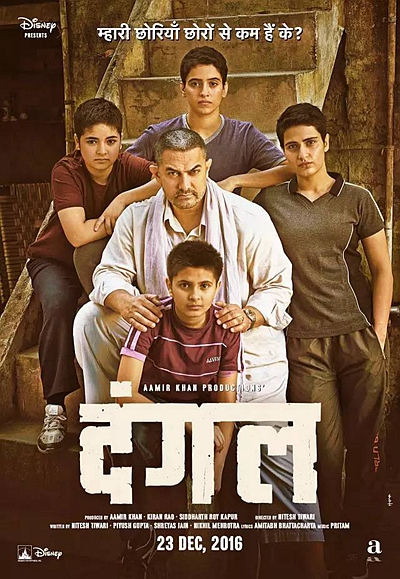Dangal underlines popularity of Indian films in China
China.org.cn by Rabi Sankar Bosu, July 20, 2017 Adjust font size:
|
|
|
The Indian wrestling film "Dangal" ends its dream run like a true champion on July 4, 2017, making history in China as the first top-grossing non-Hollywood film and winning wide praise from all sectors of the community. [File photo] |
The Indian wrestling film "Dangal" ended its dream run like a true champion on July 4, 2017, making history in China as the first top-grossing non-Hollywood film and winning wide praise from all sectors of the community.
Addressing the participants at a BRICS Media Forum in Beijing on June 7, Liu Yunshan, a member of the Standing Committee of the Political Bureau of the Communist Party of China (CPC) Central Committee, hailed the film as one of the most "successful and influential" shown in China in recent years.
Written and directed by Nitesh Tiwari and starring Indian actor Aamir Khan, Dangal took the Chinese film market by storm to join the list of all-time 20 biggest box office hits.
On Chinese media review site Douban, the film scored an aggregate of 9.2 out of 10. It has earned 1.2 billion yuan (US$176 million) in box office receipts since its Chinese release on May 5. In fact, no Indian movie has ever earned so much money, so quickly, in any foreign market.
Released to more than 7,000 theatres across China as "Shuai Jiao Ba Baba," which translates as "Let's Wrestle, Dad", Dangal struck an emotional chord with Chinese audiences.
According to the magazine Forbes, "Dangal has become the fifth highest-grossing non-English film in cinematic history, the highest-grossing live actions sports movie of 2017, and the biggest non-Hollywood import ever released in China."
This Hindi-language film is not the typical song-and-dance fare of Bollywood romance, but is based on the life of amateur wrestler Mahavir Singh Phogat who, having been denied the chance to become an international champion, trained his daughters, Geeta and Babita to wrestle in order to fulfill his dream.
Geeta and Babita won gold and silver medals respectively in the 2010 Commonwealth Games held in New Delhi.
Film critics and media analysts identified a wide range of factors contributing to the unprecedented success of Dangal. Perhaps an important reason is that Bollywood star Aamir Khan has been a much-loved actor in China for several years with his previous movies, PK and 3 Idiots.
The way Dangal was promoted on Chinese social media played a huge part in its success.
According to Aamir Khan, "the reason it has become so huge is that the Chinese connected on an emotional level with the story, the characters and the important moments of the film."
The cultural and social similarities between China and India also helped the film’s amazing success. It has appealed to Chinese audiences for several reasons, including its themes of parental love and sacrifice, its focus on the primacy of family relationships, and message of female empowerment.
The reasons behind the success were also analyzed in Xinhua news agency report: "As well as a well-written storyline and excellent acting, the ideas of breaking gender roles and reforming education inspired by the film have struck a chord with many Chinese parents."
Tan Zhen, a professor at the Beijing Film Academy who studies Indian film, told Global Times: "This story is very Chinese. I don't think it will resonate as much in countries such as the U.S." The story of a country girl becoming a world champion through her own hard work is similar to many female athletes in China, he added.
Critics have asked Chinese filmmakers to reflect on why, despite having many champions in various sports, they have "failed to make a decent sports movie."
Zhong Bingshu, the dean of Capital University of Physical Education and Sports, told the Beijing Evening News while sharing the experience of watching Dangal, "There are so many Chinese Olympic champions such as Wang Junxia who, like Geeta, came from the lower classes. The film shows how a common person becomes a champion and how that feels. Audiences want to know how these people achieved their dreams, but our Chinese sports films rarely ever do that."
Chinese parents are willing to do anything for their children's education. The film resonated with many Chinese parents who always encourage their children to work hard and strive for success. Many teachers and parents are using this family film as a motivational aid for their child's education.
Indian films have enjoyed a solid fan base in China. The first Indian film, Raj Kapoor's 1951 classic "Awaara" became a national sensation in China. Indian moves such as "Noorie" and "Caravan"("Da Peng Che") left a decades-long impression on Chinese audiences during the 1980s.
In recent years, the popularity of Indian films such as 3 Idiots (2009), Dhoom 3 (2013) and PK (2014) created new momentum for Indian cinema in China.
Cinema acts as a cultural bond between nations. Surely, Dangal has strengthened cultural ties between India and China, linked by kindred value systems, in terms of respect for family traditions, the premium on education and cultivation of the mind. Indian films have done more for India-China relations.
A 2014 film co-production agreement and film festivals could be a good way to leverage the power of cinema to boost India-China relations.
